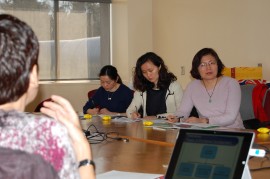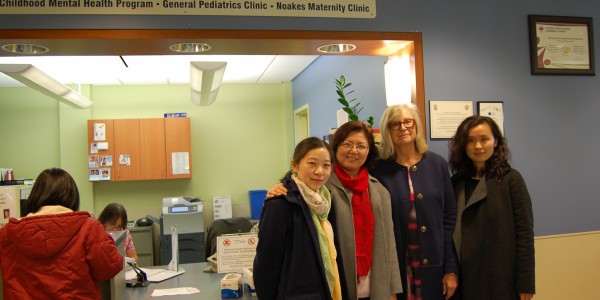Chinese children benefit from healthcare Richmond-style
Medical staff from the Nanjing Maternity and Child Health Hospital spent the day in VCH Richmond, Tuesday, learning how better to provide child-centred mental health care to their youngest patients.
Chinese early childhood mental health programs are in their infancy, but are advancing quickly thanks to a reciprocal relationship between the Nanjing facility and Richmond Hospital’s Child Health Clinic.
“Our early childhood mental health program is unique,” said Dr. Carolyn Steinberg, Richmond’s medical leader for infant, child and adolescent psychiatry, and a regular visitor to the Nanjing hospital where she shares knowledge about new findings in therapeutic Best Practice. “We take a psychodynamic approach to understand why a specific child is presenting with a particular behavior at any given time. This work is highly individualized and tailored to suit every client’s individual situation.”

Medical staff from the Nanjing Maternity and Child Health Hospital learn about self-regulation and DIR Therapy Tuesday morning at Richmond Hospital.
The Richmond program not only provides diagnosis, but also offers ongoing, wrap-around treatment to the community’s youngest clients as well as their families.
Influencing the Chinese care model
Early childhood mental health programs in China remain focused on reward-based behavior modification approaches to therapy. But this is changing.
During her trips to Nanjing, Steinberg has demonstrated with much success the child-centric model of care in one-off sessions to clinician audiences. “They have seen this kind of work in action, and the delegation has come here this week, wanting to learn more,” she said.
The visiting delegation launched into learning Tuesday morning, at 9 a.m. sharp, opening with a two-hour session at Richmond Hospital that focused on self-regulation and DIR Therapy; two models of treatment typically used to reframe challenging behaviours in children.
“Much of the work that’s going on in child-development research is centred on whole-child, whole-family thinking, and has shifting away from behavior-based models of care,” said Paula Jurczak, a DIR trainer and clinician in private practice who presented to the delegation Tuesday morning at Richmond Hospital. “The more you work with the whole child, the whole family, the better it is for everyone.”
The day also included case-study discussions, and sessions that featured treatment innovations related to developmental, emotional and behavioural issues including Autism Spectrum Disorders and new collaborative care models.
Building bridges to better care
In addition to their focus on childhood mental health, members of the Nanjing delegation also visited Richmond Hospital’s Birth Centre with Dr. Sarah Monahan, an obstetrician/gynecologist at Richmond Hospital.
This week’s visit by Nanjing physicians follows Steinberg’s 2014 visit to China where she – among other things — presented two papers on Early Childhood Psychological Development and Assessment and Treatment of Early Childhood Behaviour Problems, and demonstrated an assessment of a case of phobias in a 3-year old child to the Department of Developmental Pediatrics at Mothers and Children’s Hospital in Nanjing.
Want to know more?
Click on the link below to learn more about Dr. Steinberg’s 2014 visit to China.
Richmond psychiatrist travels to China

